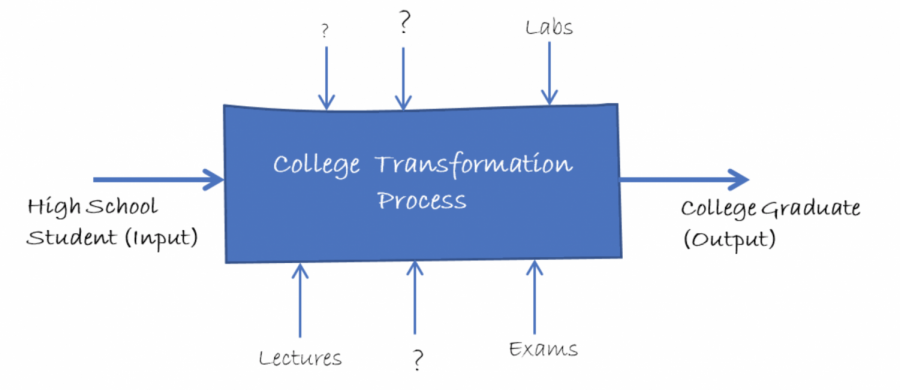Radwan: Invest in being a college student
High school students are imputed to universities from around the world and then groomed, not only by courses and labs, but by co-curricular activities until they graduate.
April 9, 2021
As part of my degree in Electrical, Computer and Systems Engineering (ECSE), I took a course that dealt with operation management, including the concept of the transformation process. In simple terms, an organization’s transformation process is their method of taking inputs and transforming them into desired outputs for clients or customers.
My professor gave an example of the college transformation process. He presented a slide, much like the included photo, featuring a flowchart with an input of high school students. Universities then transform those students by delivering lectures and labs and eventually output college graduates ready to start their professions. When he explained this, I said to myself, “College isn’t only about taking classes and passing exams.” College students should realize that if they know what their campus can offer outside of class times, the college experience can be a springboard to real-life explorations.
When Bill Gates gave a speech at Mt. Whitney High School in Visalia, California, he mentioned 11 rules of life that aren’t taught in schools. If you read or listen to those rules, then you’ll realize that there’s a huge gap between college life and real life. Graduating from college with only the knowledge derived from mandatory courses leads to a gap between fresh graduates and employers. Filling this gap—and being equipped for real-life challenges post-graduation—can be achieved by taking part in co-curricular activities.
The American Heritage Dictionary defines the word “extracurricular” as “Being outside the regular curriculum of a school or college.” The prefix “extra-” to me sounds like a less important, additional load to college coursework. Although “extracurricular” is common in our vernacular, I much prefer “co-curricular” because it implies that school activities ought to be conducted in conjunction with academic coursework. This should be the case, since those activities build skills listed on resumes.
I’m aware that different majors can have varying levels of difficulties or course loads. Students who are overwhelmed with school assignments may think they don’t have enough time for co-curricular activities. In reality, such activities do not necessarily require large undertakings.
For example, in my first year at Case Western Reserve University, I wanted to improve my communication and presentation skills—two areas that were rarely addressed in my courses. I decided to join CWRU Toastmasters Club, where members meet once a week for 90 minutes to give prepared and impromptu speeches. This co-curricular offered me the opportunity to hone another skill without a major undertaking or affecting my schoolwork.
Depending on your major and passion, you might be interested in joining student organizations that are oriented around community service, religion, media and publication, sports, politics or multiculturalism. I’m confident each of these organizations has something to offer. Over time, you’ll build crucial personal skills such as teamwork, time management, leadership, event organization, collaboration and media production.
Not only are these skills helpful for everyday life, but they’re also sought-after by employers across disciplines. I recently applied for an internship at a company producing indoor air quality systems. During the interview, I noticed the interviewers paid attention to the personal skills I listed together with my co-curricular activities and past part-time jobs. I felt as though the two interviewers were trying to verify my personal skills by getting to know further details about my co-curricular activities. This is likely because they were of the opinion that those activities outside class were the ones that really shape necessary skills.
That said, COVID-19 restrictions have complicated engagements. Most student organizations have had to cancel events or transition meetings to be remote. However, many have still managed to remain dedicated to their initiatives. While this sounds more challenging, I think members of student organizations these days have a chance to prove that they can overcome COVID-19 challenges, despite claims that the pandemic has slowed down most student activities. Overcoming these inevitable challenges still gives current students an opportunity to thrive. If they decide to seize this opportunity, then they can prove via their resumes they’re capable of facing and overcoming any future challenges.
Because your time in college is limited, it’s important to think about what your ambitions are after you graduate. Getting a college degree is good, but it would be even better and more strategic if you build real-life personal skills through co-curricular student activities.


